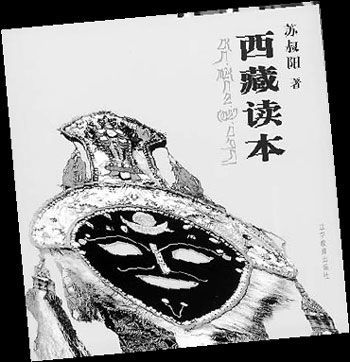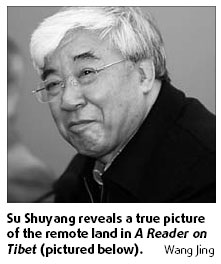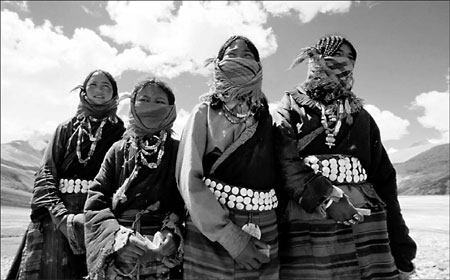Unveiling Tibet
|
Scholars and writers around the world have tried to reveal more about the life of Tibetan people. Shui Xiaojie |
Tibetan religious leader Phagpa was a mentor to the mighty Kublai Khan and shortly after he left Dadu (today's Beijing), Marco Polo arrived in the great city.
The young Italian was blown away with what he saw in the city. Polo's writings of wonders and riches inspired Christopher Columbus to set sail in search of the new world, but a new book reveals how Phagpa had influenced Polo and consequently trigger a chain of events that helped shape the world today.
But author Su Shuyang says the history and culture of Tibet is "a Mount Qomolangma, whose summit is beyond my reach".

"I often dream of being a Tibetan myself," says the Han Chinese recounting the joys of writing A Reader on Tibet (Xizang Duben).
Despite his poor health - the 71-year-old has lost one kidney and part of the lungs due to cancer - Su was spellbound learning about one of the world's most fascinating regions and in the process writing another landmark book.
For the first 18 years of his working life Su was a university history and philosophy teacher before he wrote one of the first retrospective works on the "cultural revolution" (1966-76).
His drama Song of the Red Heart (Dan Xin Pu), published in 1978, was a huge success and over the past three decades, he gained many national literary awards with novels, dramas, movie scripts, poems and commentary.
His 2005 book A Reader on China (Zhongguo Duben) was an immediate success and sold more than 12 million Chinese copies. After this success, Su's foreign friends suggested he write about Tibet in the same reader-friendly way he did in A Reader on China.
Su grew up in North China's Hebei province and admitted: "My knowledge about Tibet and Tibetology is equal to that of a primary school student, or even less."
Over the past three years, Su studied some 200 classics and 50 film files about Tibet before the book was launched in December.
In recent years, the tremendous growth of Tibet has caught the world's eye and many books have been published about this remote part of the world. But China's literary critics and Tibetology researchers say Su's work is a standout.
"This book strikes me the most because it looks at Tibet from a global perspective," says Zhang Xiaoping, editor-in-chief of China Tibet Information Center. Zhang was one of the experts who helped Su plan the book.

These world events go back centuries and the book's structure displays Su's rich experiences as a playwright.
He opens with a grand scene featuring Princess Wencheng of the Tang Dynasty (AD 618-907) leaving Chang'an (today's Xi'an) for Tubo (ancient name of Tibet) to marry the king Songtsen Gampo.
Su moves on to Xuan Zang, a monk who had left Chang'an more than 14 years before Princess Wencheng, in his journey to India for the truth of Buddhism.
The discussion of how Buddhism's center moved eastward from India to China "highlights the mutual influence and interactions of Han and Tibetan cultures", says Bao Mingde with the Institute of Literature in the Chinese Academy of Social Sciences.
From religion, language, family lineage and other aspects, Su proves that Tibet has been assimilating various cultures and it has always been part of the multi-faceted Chinese civilization.
The book is especially meaningful because it "powerfully criticizes the distorted views on Tibet", says Bao.
Great Britain's scheming to control Tibet is revealed and Su details how the British troops tricked the Tibetans into a 1903 battle.
Su also reveals that religion, ethnicity and geography are not the chief reasons why there is a mist shrouding Tibet, Bao says.
Su states that foreign political powers' ambitions, upper-class Tibetan interest groups' nostalgia to their privileges in the feudal serf system, and China's weakness in certain historical periods are the real culprits behind the distorted views on Tibet.
Wu Heping, spokesman with the Ministry of Public Security, says Su has "touched an acupuncture point" by disclosing the difference of Tibet and the West in their ruling systems that combined politics with religion.
During the Middle Ages, European countries followed Caesaropapism, in which the secular rulers needed the Church to recognize their rule. In Tibet, however, the religious leaders, who ruled until 1959, had to gain recognition from the Chinese central government.
After last year's March 14 incident in Tibet, Wu was involved in press conferences in which many foreign journalists questioned the happenings in Tibet. At one press conference Wu quoted Su.
"Would the people who cry for human rights in Tibet be willing to see troops of slaves in wooden shackles wandering at the foot of the glorious Potala Palace and on the banks of the crystal-clear Yarlung Zanpo?" he read.
"Would they be willing to hear the serfs' wails and sighs brought by the wind for days and nights?"
Wu asked the international journalists for more questions but for one minute there was absolute silence.
Wu says this had never happened during the some 100 press conferences he had held. He said the power of Su's language had literally silenced the critics.
Purike, a Tibetan editor with the Ethnic Publishing House, says Su made minor mistakes, such as saying Princess Wencheng presided over the translation of Buddhist classics into Tibetan language.
But he welcomes Su's effort.
"The fact that such an influential scholar has commented on our Tibetan history and culture has greatly boosted our confidence," he says.
Palbar Dorje, dean of the Tibetology Department with the Central University for Nationalities, says the book has captured latest views in international Tibetology circles.
The Tibetan version of Su's book will soon be published. Publishers in the United States, Germany and other countries are discussing promoting Xu's work abroad, says Yu Xiaoqun, head of the Liaoning Publishing Group.
(China Daily 03/09/2009 page8)
















